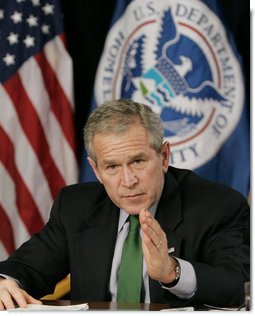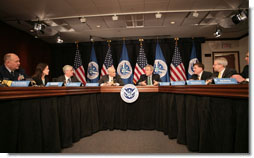
 |
For Immediate Release
Office of the Press Secretary
February 8, 2007
President Bush Discusses Department of Homeland Security Priorities
Department of Homeland Security
Washington, D.C.
![]() In Focus: Homeland Security
In Focus: Homeland Security
![]() In Focus: National Security
In Focus: National Security
4:20 P.M. EST
THE PRESIDENT: Mr. Secretary, thank you very much for the hospitality. I appreciate you inviting me over to hear what has been a substantive briefing by your different operating entities.
First of all, I'm very proud of the hard work of the men and women of the Homeland Security Department. This vital department is actively engaged in the war on terror. We are still a nation at risk. Part of our strategy, of course, is to stay on the offense against terrorists who would do us harm. In other words, it is important to defeat them overseas so we never have to face them here. Nevertheless, we recognize that we've got to be fully prepared here at the homeland.
 Part of that preparation requires a robust budget. We submitted the
budget, you testified on the budget. It's about an 8 percent increase
in the budget of the Homeland Security Department.
Part of that preparation requires a robust budget. We submitted the
budget, you testified on the budget. It's about an 8 percent increase
in the budget of the Homeland Security Department.
This department works to secure our borders. I appreciate very much, Ralph, you and your department's hard work of doing a difficult job, and that is doing what the American people expect and that is to have secure borders. But we're making good progress. We're modernizing a border that needed to be modernized, whether it be through fencing or the different types of high-tech investments.
I firmly believe that in order for your Border Patrol agents to be able to do their job, we need a guest worker program so that people don't have to sneak in our country, and therefore, we can really enable your good folks to be able to focus on terrorism, drug runners, gun runners.
I appreciate so very much the fact that we've got a wise strategy to effect the security of our ports and cargo. We've got a lot of good people working hard overseas. In other words, we're inspecting cargo before it leaves a port -- foreign port -- so that the first line of defense is away from our shores, or away from our ports. And we've got a lot of good people working hard to achieve that.
I appreciate so very much the effort of TSA. You've got a hard job. It's a job that really was a response to 9/11, and that is we don't want people getting on our airplanes that will terrorize our fellow citizens again. I fully recognize that there are thousands of hardworking people that are trying to do their best to, on the one hand, accommodate our fellow citizens as they travel; on the other hand, protect our country from attack.
We also talked about the need to have effective response if there is a emergency, if there is a catastrophe. And one agency that has been under fire and that needed to be reorganized was FEMA, and I asked David Paulison to do just that. We took the lessons learned from Katrina and applied it to this vital agency. And this agency was recently tested through the tornadoes there in central Florida. And I want to thank you, Dave, and your team for a quick response to help the poor citizens who were affected by that natural disaster.
 The Department of Homeland Security was initially melded together by
organizations that tended to be stove-piped -- independently run
organizations that we felt needed to be brought under the central
planning, the central organizing principle of a single department. The
organization of such a vast enterprise has been difficult and
complicated; nevertheless, there is noticeable and substantial and
measurable progress.
The Department of Homeland Security was initially melded together by
organizations that tended to be stove-piped -- independently run
organizations that we felt needed to be brought under the central
planning, the central organizing principle of a single department. The
organization of such a vast enterprise has been difficult and
complicated; nevertheless, there is noticeable and substantial and
measurable progress.
And I appreciate all the hardworking folks for putting together an institute, part of our government, all aiming to protect the American people.
And so, Secretary, thank you for the invitation. I appreciate the hard work of the people of this department. I oftentimes say to the American people that you can go about your business, you can run your enterprises, you can send your children to school, knowing full well that there are thousands of our fellow citizens who work every day, 24 hours, to help you by protecting this homeland. And this is where it all starts. And I thank you for your hard work.
Thank you.
END 4:25 P.M. EST